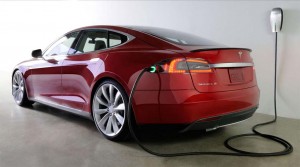Could Tesla Motors be on the verge of a major breakthrough – one that eliminates the biggest concern people have about electric vehicles? That’s something the California carmaker’s CEO Elon Musk suggested is in the works.
“About to end range anxiety,” the South African-born executive tweeted on Sunday, promising to have a major announcement involving the maker’s Model S battery cars on Thursday morning.
Range anxiety is the term used to describe the fear motorists have that they might run out of power before reaching their destination. And, along with the high price for battery vehicles, it’s seen as a significant obstacle to wider acceptance of the technology.
(Porsche may add new EV sports car to line-up. Click Here for the latest.)
The vast majority of battery cars currently on the market barely manage 100 miles between charges, barely what a conventional, gas-powered vehicle can deliver on a quarter tank of gas. Even the longest-range version of the Tesla Model S can’t quite make 300 miles. That means battery-cars are largely limited to use around town, rather than being able to serve as true replacements for vehicles using internal combustion.
Complicating matters is the lack of a widespread battery charging infrastructure. And most of the current public chargers require hours to fully recharge a vehicle.
(Tesla gets off to a slow and troubled start in China. Click Here for the full story.)
Tesla has tried to address the issue in several ways. It has offered buyers the option of purchasing the Model S with a larger battery pack. It has launched construction of a coast-to-coast “Cupercharger” network, high-speed chargers that can give a Model S an 80% “fill-up” in barely half an hour. And it is planning to also make it possible for owners to quickly swap out depleted batteries for fully charged lithium-ion packs.
What next? In his tweet, Musk hinted that Tesla will now address range anxiety “via OTA software update. Affects entire Model S fleet.”
The Silicon Valley start-up has designed its vehicles so that it can remotely reprogram them to address software issues. And several possible solutions are being discussed in the technology community.
One is known as “torque sleep.” This would allow more efficient operation by versions of the Model S equipped with twin electric motors, the most recent additions to the line-up known as the 85D and P85D models.
But Musk stressed that all Model S sedans will benefit from the update, which could involve such things as tweaks to the car’s battery control system, or perhaps a new power-saving mode that kicks in when the vehicle is cruising – possibly like the displacement-on-demand system used on the Chevrolet Corvette that lets its big V-8 operate more like a compact 4-cylinder engine when coasting and cruising to get as much as 30 mpg on the highway.
Can Tesla truly eliminate range anxiety? Probably not. Even when the Supercharger network is complete, they will be few and far between and won’t allow motorists to charge up their battery cars as quickly and easily as filling up a gas tank. But the longer the range the less motorists will have to constantly be thinking about where to get their next watt of energy as they commute to work or run their kids to soccer practice.
Tesla, incidentally, isn’t alone in trying to address the range anxiety issue. General Motors last month confirmed it will launch the new Chevrolet Bolt which, at 200 miles per charge, will double the range of the current Chevy Spark EV. Audi, meanwhile, has revealed it is developing a new SUV, likely to be called the Q6 e-tron, that will get over 300 miles per charge.
Electric vehicle proponents hope that such longer-range products will make battery technology more acceptable to a mass automotive audience in the years ahead.
(For more on Audi’s electric SUV plans, Click Here.)


I’d like to see a standardized EV range test which includes testing in cold weather with the heater, wipers, etc. in operation along with snowy or icy road conditions and then a hot weather test akin to the EPA city/highway ratings for fuel mpg. The EV makers range claims can be very misleading and disingenuous.